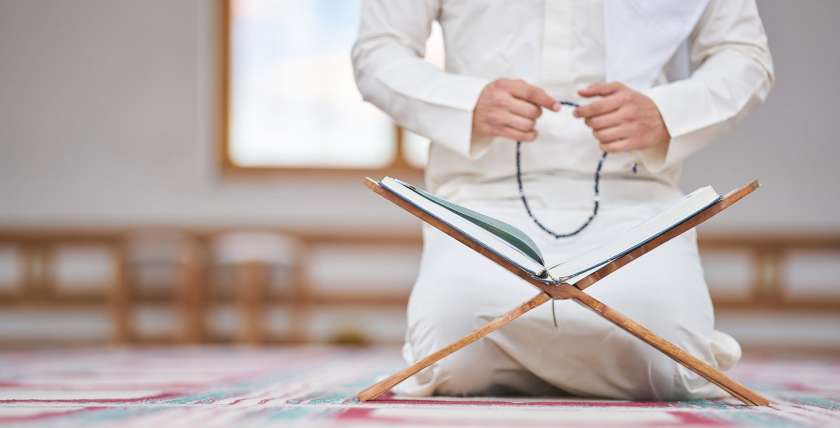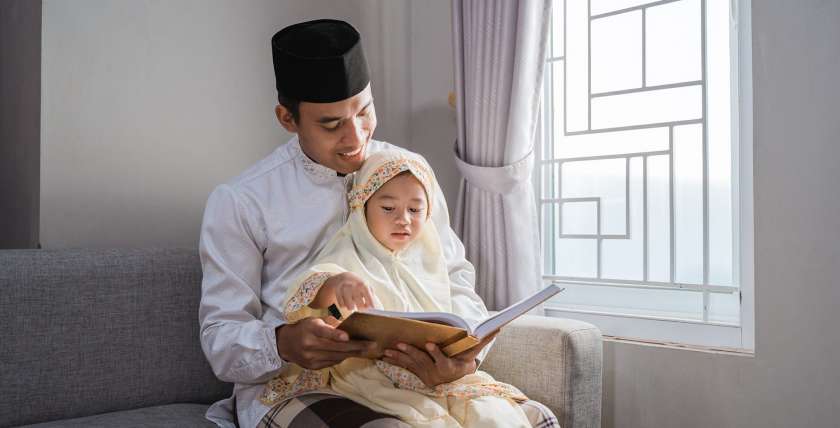Who is the Prophet Muhammad? Lineage and Birth
Born about 570 into a respected branch of the prestigious and influential Qurashi family of Mecca, Ban Hashim, Muhammad bin Abdullah bin Abdul-Muttalib bin Abd Manaf bin Qusay bin Kaleb bin Marra bin Kaab bin Lu’ay bin Ghaleb bin Fahr bin Malik bin Al-Nadr bin Kinana bin Khuzaymah bin Madrakah bin Ilyas bin Mudar bin Nizar bin Maad bin Adnan.
Abdullah the father of the Prophet married Amna Bint Wahab. The Prophet – Peace and blessings be upon him – was born on the twelfth of the month of Rabi` Al Awal of the year of the Elephant – the year in which Abraha went to destroy the Kaaba – but Arabs confronted him, and Abd al-Muttalib told him that the house has a God who protects it. When Abraha came with the elephants, Allah the Almighty sent upon them birds carrying stones from a fire that destroyed them, and the Almighty protected the house from any harm.
Early life:
Muhammad – Peace be upon him -was orphaned before born. Earlier months before the birth of Muhammad, his father died near Madinah on a mercantile mission to Syria. When Muhammad was six, he accompanied his mother Amina to Madinah to visit her dead husband’s tomb. While returning to Mecca, Amina died at a desolate place called Abwa and buried there. Abdul Muttalib, Muhammad’s grandfather, took the responsibility of raising his grandson, but he died after two years when Muhammad was only eight, and he recommended Abu Talib, Muhammed’s uncle, to take care of raising Muhammad.
According to Arab custom, after his birth, Muhammad was sent to BanuSa’ad clan, a neighboring Bedouin tribe. There, Muhammad spent the first two years of his life with his foster-mother Halima, who asked his mother Aminah to keep him for the blessings and benevolence which returned to her tribe for his presence; So Aminah agreed, and Muhammed spent his first five years with his foster-mother Halima As-Sadia.
Based on Islamic narrations, Allah, the Almighty, sent two angels who opened his chest, took out the heart, and removed a blood clot from it. He then washed with Zamzam water in a golden washbowl. In Islam, this incident signifies the idea that Allah, the Almighty, purified his Prophet and protected him from sin or involving in any disrespectful and coarse practice.
Muhammad’s sheep herding:
Abu Talib was not very rich, so Muhammed helped his uncle in sheepherding in Mecca. Abu Hurairah – May Allah be pleased with him – reported: The messenger of Allah – Peace be upon him – said, “Every Prophet has tended sheep”. He was asked: “And did you?” He replied, “Yes, I tended them for a few carats for the Makkans.” [Al-Bukhari].
Muhammad’s youth and marriage with Khadija:
Around the age of twelve, Muhammad accompanied his uncle Abu Talib in a mercantile expedition to Syria and gained experience in commercial business. On this journey, Muhammad is said to have been recognized by a Christian monk, Bahira, who prophesied about Muhammad’s future as a Prophet of Allah.
Khadija Bint Khuwaylid, a distinguished Quraysh lady, was a merchant woman with honor and money. She was told about Muhammad and his integrity and honesty, so she offered him to be the caretaker of her mercantile activities and give him the best that she would give to other merchants. Muhammad accepted and went out to Shaam, and when he arrived there, he sat under a tree close to a monk’s Monastery called Nestorius, who told Maysara, Khadija’s servant, that no man sat under this tree but Prophets. Later, he came back with earnings twice than she gained before. Khadija attracted by his well-mannered, honesty, and trustworthiness; accordingly, she sent a marriage proposition to Muhammad through her maidservant, Meisara. As Muhammad gave his consent, the marriage solemnized in the presence of his uncle, Abu Talib, and others said that Hamza bin AbdAlmutalib who engaged her. Khadija was the first wife to whom Muhammad was married, and he lived with her for twenty-five years until she died. She gave birth to all his sons except Ibrahim.
The Prophethood of Muhammad:
The beginning of the revelation:
After Muhammad – Peace be upon him – married Khadija and involved in the commercial merchandise, and when got forty years old, he started to withdraw into a cave – called Mount Hiraa – for contemplation and reflection. Aa’esha – the mother of the faithful believers – said: (The commencement of the Divine Inspiration to Allah’s Messenger was in the form of good dreams which came true like bright daylight, and then the love of seclusion was bestowed upon him. He used to go in seclusion in the cave of Hira where he used to worship (Allah alone) continuously for many days before his desire to see his family. He used to take with him the journey food for the stay and then come back to (his wife) Khadija to take his food likewise again till suddenly the Truth descended upon him while he was in the cave of Hira. One day, in Ramadan, in the year of 610 before CE, while he was there for contemplation, the revelation Jibril appeared to him and said, ‘Recite.’, Muhammad replied: ‘I am unable to recite.’. There upon the angel caught hold of him and embraced him firmly. This happened two more times after which the angel proclaimed Muhammad to read the following Ayaat:
The angel came to him and asked him to read. The Prophet (ﷺ) replied, “I do not know how to read.” The Prophet (ﷺ) added, “The angel caught me (forcefully) and pressed me so hard that I could not bear it any more. He then released me and again asked me to read and I replied, ‘I do not know how to read.’ Thereupon he caught me again and pressed me a second time till I could not bear it any more. He then released me and again asked me to read but again I replied, ‘I do not know how to read (or what shall I read)?’ Thereupon he caught me for the third time and pressed me, and then released me and said, ‘Read in the name of your Lord, who has created (all that exists), created man from a clot. Read! And your Lord is the Most Generous.” (96.1, 96.2, 96.3) Then Allah’s Messenger (ﷺ) returned with the Inspiration and with his heart beating severely.
After this majestic incident, Muhammed back home to Khadija terrified, asking her to console him saying (Datherini Datherini). Khadija took Muhammad to Waraqah bin Nawfel who testified the prophecy of Muhammad Peace be upon him).
The call-in for the cause of Allah:
The secret call in Mecca:
The circumstances of the da`wah were not settled in Mecca due to the spread of idolatry and the involvement of Allah; Therefore, it was difficult to call for the unification of Allah directly in it at the beginning of the matter, so what was from the Muhammad except the sacrament of the invitation, and he began to invite the people of his house and who saw in it the sincerity and desire to know the truth, so his wife Khadija and his successor Zaid bin Haritha, Ali bin Abi Talib and Abu Bakr Al-Siddiq The first to believe in his call, then Abu Bakr supported the Messenger in his call, and he embraced Islam on his hands: Othman bin Affan, Al-Zubayr bin Al-Awam, Abdul-Rahman bin Auf, Saad bin Abi Waqas, and Talhah bin Ubayd Allah, then Islam spread in Mecca little by little until he publicized the call Three years after her secrets.
The overt call in Mecca:
The Prophet – Peace be upon him -started by calling his tribe in public, and the Prophet said: (And I warn your tribe of kin), the Messenger ascended the Mount of Safa and called upon the tribes of Quraish to unite Allah, the Almighty, but they disdained him, but the Messenger did not hesitate to call himself, and Abu Talib took himself to protect the Messenger and did not heed Quraish’s words in response to the Messenger’s call.
The boycott of Muhammad and Banu Hashim:
The tribes of Quraysh agreed to boycott the Messenger and those who believed in him and besieged them in the people of Bani Hashem, and that boycott was not to deal with them in buying or selling, in addition to not marrying with them. And ended, after Hisham bin Amr consulted with Zuhair bin Abi illiteracy and others in ending the siege.
And they were to split the boycott document, they found that it had ceased to exist except in “your name, O Allah,” from it, and thus the siege was lifted.
The year of sorrow:
Khadija, who served as a guard for the Messenger of Allah, died three years before his migration to Madinah.
In the same year, Abu Talib, who was protecting Muhammad from the harm of Quraysh, became very ill.
When his illness became more severe, and Quraysh people started to harm Muhammed severely after they asked him to stop Muhammad from his Dawa, Abu Talib told him what they wanted, but Muhammad did not pay attention to them. Muhammad asked his uncle to declare his Islam and say Shahada, but he unfortunately refused and died unmuslim.
These two deaths in the same year were very hard for Muhammad.
They were bond, support, and protection for him, and that year was called the year of sorrow.
The call outside Mecca:
The Prophet Muhammad – peace be upon him – went to Taif to invite the tribe of Thaqif to unite Allah after the death of his uncle and his wife, and he was harmed by the Quraysh. He was asking from the Thaqif of his support and protection and believing in what he came with, hoping for acceptance, but they did not respond and met him with ridicule and mockery.
Migration to Abyssinia:
Muhammad urged his companions to migrate to the land of Abyssinia; Given what they were subjected to torture and harm, informing them that there is a king who does not abuse anyone, so they left Mecca immigrants, and this was the first immigration in Islam. They numbered eighty-three men, and when Quraish heard about the immigration order, they sent Abdullah bin Abi Rabia and Amr ibn al-Aas with gifts. The gifts were to the Negus, king of Abyssinia, and they asked him to return the immigrant Muslims. In protesting that they had differentiated their religion from which they were, except that the Negus did not respond to them and asked the Muslims to clarify their situation, then Jaafar bin Abi Talib spoke on behalf them, and talked that the Muhammad guided them to the path of righteousness, away from obscenity and vices, so they believed in him, but they were harmed because of that. Later, Jaafar recited the beginning of Surat Maryam, and Najashi cried so hard, then he told the messengers of Quraysh that he would not hand over any of them, and he returned their gifts to them. Despite that, they went back to Najashi the next day, telling him that Muslims interpret the saying of Isa bin Maryam, but he heard from the Muslims their opinion of Isa.
They told him that he is a messenger of Allah, and they believed in him as they believed in Muhammed. Thus, the Negus believed the Muslims and refused the allegations of Abdullah and Amr.
Al Isra wa Al-Miraj:
Al Isra wa Al-Miraj is on the 27th of Rajab, the seventh month in the Islamic schedule. It is the night that Allah, the Almighty, took Muhammad on a trip from Mecca to Al-Quds (Jerusalem) and then to heaven. Al-Isra wa Al-Miraj took place during a time when the Prophet Muhammad was facing intense hardship and pain. The Quraysh, who were his tribe and his family, constantly ridiculed, humiliated, and oppressed the Prophet – Peace be upon him – and his followers. Moreover, the Prophet – Peace be upon him – had just faced the Year of Sorrow, during which he lost his beloved wife Khadijah and his uncle Abu Talib, who was his protector and alliance.
The pledges at Al-Aqaba:
A delegation of supporters, numbering twelve men, came to the Muhammad to pledge allegiance to Allah, the Almighty, and not stealing or falling into adultery or transgressions or false speech. That pledge was made in a place called Al-Aqaba; That is why it was called the first pledge of Al-Aqaba, and the Prophet Muhammad sent Musab bin Omair with them to teach them the Qur’an and show them matters of religion. In the following year in the Hajj season, seventy-three men and two women came to Muhammad Peace be upon him; to pledge allegiance to him, and then the second Al-Aqaba pledge was done.
Migration (Hijra):
Muslims migrated to Madinah; to preserve their religion and themselves, and to establish a safe homeland in which they live according to the principles of the Dawah. Abu Salamah and his family were the first to emigrate, and Suhaib followed him after he gave up all of his money to the Quraysh to unite Allah, the Almighty. Muslims followed each other in immigration until Mecca was almost empty of Muslims. On that account, Quraish fear the consequences of Muslim immigration; under that circumstances, a group of them met in the seminar house in search of a way to get rid of Muhammad peace be upon him.Quraish ended up having to take from every tribe a young man and strike the Prophet as a one-man; in that case, Bani Hashim cannot take revenge on them.
On the same night, Allah authorized Muhammad to emigrate, so he took Abu Bakr as his companion, and placed Ali bin Abi Taleb in his bed. Prophet Muhammad hired Abdullah bin Ariqit to guide him on the way to Al-Madinah, so the Prophet went out with Abu Bakr, heading for the cave of Thor. When Quraysh heard about the failure of their plan and the emigration of Muhammad, they began searching for him, until one of them reached the cave. Abu Bakr experienced the great fear of Muhammad, but the Prophet reassured him that the Almighty would protect them. They remained in the cave for three days until the conditions stabilized, and the search for them stopped. Then they resumed their path to the city and reached it in the thirteenth year of revelation, on the twelfth day of Rabi Al-Awwal. Muhammad and his companion Abu Baker stayed fourteen nights in Bani Amr ibn Awf, during which Muhammad founded the Quba Mosque, the first mosque built in Islam, after which he began establishing the foundations of the Islamic state.
Al-Madinah Al Munawwarah document:
Al-Madinah needed a document that organizes and guarantees the rights of its members, so Prophet Muhammad wrote a document that served as a constitution among immigrants, supporters (Al-Ansar), and Jews. The document was of great importance as it was the constitution that organizes the affairs of Al-Madinah at home and abroad. Muhammad – Peace be upon him -established the conditions according to the provisions of Islamic Sharia, and he was fair in terms of treatment with the Jews.
Names of conquests of Arabia:
- Battle of Badr.
- Battle of Uhud.
- Battle of Banu Nadir.
- Battle of the Confederates, Battle of the Trench (Battle of Khandaq).
- Battle of Banu Qurayza.
- Battle of Khaybar.
- Battle of Mo’ ta.
- Conquest of Mecca.
- Battle of Hunayn.
- Battle of Tabouk.
Miracles:
- Al-Isra wa Al-Miraj.
- Splitting of the moon.
- Telling stories of the unseen.
- Talking with birds and animals.
- During the Battle of the Trench; when Muhammad struck the rock three times, after glorified the name of Allah, he said that he had been given the keys of the kingdom of Syria, the keys of Persia and he could see its white palaces, and the keys of Yemen and he could see the gates of Sana.
Farewell Pilgrimage:
Muhammad expressed his desire to perform the Hajj and left Al-Madinah for Abu Dujana to manage its business, and he walked towards the old house and gave a speech, known later as the Farewell Sermon. The main contents of Farewell Sermon: Warning against devouring usury, and the concentration on adhering to what came in the Holy Qur’an and the noble Prophet’s Sunnah.
Death:
Muhammad fell ill and suffered for several days with fever, head pain, and weakness after his return from the pilgrimage. Throughout his illness, he elected Abu Bakr to lead the prayers in the mosque. Muhammad died on 8 June 632, in Madinah, at the age of 62 or 63, in the house of his wife Aisha.
“When the Messenger of Allah – Peace be upon him -passed away, Abu Bakr was with his wife, the daughter of Kharijah, in villages surrounding Al-Madinah. They started to say: ‘The Prophet – Peace be upon him -has not died, rather he has been overcome with what used to overcome him at the time of Revelation.’ Then Abu Bakr came and uncovered his (the Prophet’s – Peace be upon him -face, kissed him between the eyes and said: ‘You are too noble before Allah for Him to cause you to die twice. By Allah, the Messenger of Allah – Peace be upon him -has indeed died.’ ‘Umar was in a corner of the mosque saying: ‘By Allah, the Messenger of Allah – Peace be upon him -has not died and he will never die until the hands and feet of most of the hypocrites are cut off.’ Then Abu Bakr stood up, ascended the pulpit, and said: ‘Whoever used to worship Allah, Allah is alive and will never die. Whoever used to worship Muhammad, Muhammad is dead. “Muhammad is not more than a Messenger, and indeed (many) Messengers have passed away before him. If he dies or is killed, will you then turn back on your heels (as disbelievers)? And he who turns back on his heels, not the least harm will he do to Allah; and Allah will give reward to those who are grateful.’ ‘Umar said: ‘It was as if I had never read (that Verse) before that day.’






